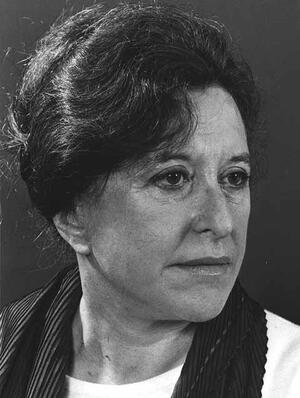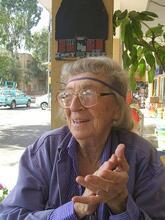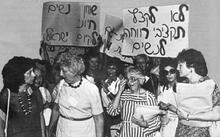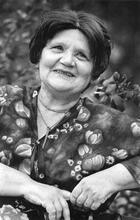Shulamith Hareven
Born Shulamith Ryftin, Hareven fled Poland for Palestine with her family in 1940. She published her first book of poems, Predatory Jerusalem, in 1962, and went on to write nineteen books that ranged from her vivid historical novel City of Many Days (1972) to the powerful reportage of The Vocabulary of Peace (1995). She served as a war correspondent in 1967 and 1973 for the daily newspaper Yediot Ahronot and was the first woman inducted into the Israeli Academy of the Hebrew Language. She wrote passionately about her love for Israel while also being a vocal critic of Israeli treatment of Palestinians and serving as a spokesperson for Peace Now. Her final book, Many Days, Autobiography, was published in 2002.
Early Life and Family
“Born in Europe, all my days there passed in an obscure impatience, as if it were all a mistake, a confinement, like a wretched marriage—until I first saw strong light on rocky hedges on a mountain, a stooping summer olive tree, a well carved in stone—and I knew that was it. I had arrived at some deep, palpable ancientness, at the womb of the world, where virtually everything was and will be created. Here were the right light, the right smell, the right touch.” (On Being a Levantine in The Vocabulary of Peace, 1995).
Shulamith Hareven was born in Warsaw on February 14, 1930, the daughter of Abraham Ryftin (born Warsaw 1899, died Jerusalem 1995) and Natalia Wiener (born Warsaw 1903, died Jerusalem, 1996). Her father was a lawyer and her mother a teacher.
Literary Legacy
Making her debut with a book of poems, Predatory Jerusalem (Hebrew, 1962), Hareven never tired of exploring new artistic avenues, publishing nineteen Hebrew books in a variety of genres, including suspense fiction (under an androgynous pseudonym) and children’s literature (inspired by her grandchildren). Her exceptional mastery of language and style made her one of Israel’s outstanding essayists, the recipient of the Avrech Best Essayist Prize. Her terse essays and press columns gained momentum in the aftermath of the 1973 war and the 1977 fall of the Labor government. They have been collected in three Hebrew volumes and one selection in English, The Vocabulary of Peace (1995). Throughout the 1980s, no controversial topic escaped her pen: Palestinian refugees (with whom she spent time at the height of the first intifada), “enlightened occupation” (which she claimed was a meaningless locution), internal religious and ethnic divisions, violence and the peace movement, the academization of literature (written when she was a writer-in-residence at the Hebrew University in 1990), slang and linguistic norms (reflecting her work at the Israeli Academy of the Hebrew Language, where she was the first woman appointee), and finally, “Eyeless is Gaza,” the 1988 essay that gave its title to her third collection of essays in Hebrew (1991).
Jerusalem
Though Hareven strongly advocated separation between “biography and bibliography,” a rare autobiographic essay, “On Being a Levantine” (1985), makes clear why this ardent Zionist preferred her adopted homeland in the sunny Levant to the gloom and doom of her European birthplace, Warsaw. Having escaped the Holocaust as a child (arriving in Palestine with her parents in 1940), she rarely evoked its memory, preferring to begin her life story with her participation in the 1948 Israeli War of Independence, in which she served as a combat medic in besieged Jerusalem.
Jerusalem remained her hometown, where, after serving as an officer in the Israel Defense Forces, she married social activist Alouph Hareven in 1954, and gave birth to a son, Itai, in 1957 and a daughter, Gail, a prolific writer, in 1959. Jerusalem is also the “heroine” of Hareven’s first novel, City of Many Days (Hebrew, 1972; English, 1977). In this beautifully written work, she nostalgically imagines a multicultural and cosmopolitan Jerusalem before World War II, brazenly crossing many boundaries—religious, ethnic, and sexual. Although she always questioned the category of “women writers” and labeled herself “a selective feminist,” City of Many Days anticipated by a decade Israel’s belated literary feminism, by sporting one of the most autonomous (androgynous) heroines in Israeli fiction. A scion of a veteran Descendants of the Jews who lived in Spain and Portugal before the explusion of 1492; primarily Jews of N. Africa, Italy, the Middle East and the Balkans.Sephardi family, Sara Amarillo epitomizes freedoms that are too unconventional for her time and place but neatly represent feminist aspirations of the late twentieth century.
Literary Writings
In her short fiction, which ranges from social farce to lyrical impressionism, Hareven often portrays with empathy characters that are socially marginal or deviant. Twilight and Other Stories, an English selection of her short fiction (English, 1992), features the fascinating story “Loneliness” (Hebrew, 1980), which Professor Gershon Shaked saw as “the subtlest and the deepest of Hareven’s realistic stories.” Indeed, this was the first Hebrew narrative to evoke lesbianism. It did this, however, with a typical Jewish twist, anchoring its protagonist’s homoeroticism in her traumatic Holocaust childhood. The first story of the collection, on the other hand, is one of Hareven’s few direct treatments of the Holocaust. It powerfully constructs a dream-like visit to the narrator’s European birthplace, now a city of night and darkness.
The innovative triptych, Thirst: The Desert Trilogy (1996), is a fictional experiment comprising ostensibly “biblical” novellas, written in sparse Hebrew (“multifaceted miniatures,” translator Hillel Halkin called them), that retell some of the most cherished foundational myths of Israel and the Jewish people—the Exodus, the conquest of Canaan (the book of Joshua), and the period of consolidation of the Israelite tribes under the rule of the Judges. Needless to say, Hareven’s retelling is very far from the original, producing a “modern midrash” (as suggested by scholar Yaakov Elboim), which Israelis were slow to grasp but English readers warmly applauded. The trilogy as a whole weaves together Hareven’s two major themes—the outsider and marginal (of both sexes), and the independent woman—framing both in a distant time that is nevertheless wholly ours.
In her last book, Many Days, Autobiography (Hebrew, 2002), Hareven undertook a surprisingly different venture. Denigrating the contemporary tendency to self-revelation, she claims that “culture begins where people recognize the difference between the private and the public.” Her autobiography, comprising the most poignant excerpts of her writings in all genres—fiction, verse and essays—is a testament to the life of a profoundly engaged woman and author, one who rejected the proposition that the personal is the political, and who did not believe that “a room of one’s own” should be the subject of public display.
Death and Acclaim
Many of Hareven’s prose works are available in English and her fiction is widely translated, winning her recognition by the Parisian newspaper L’Express as one of the one hundred women “who move the world.”
Shulamith Hareven died of cancer in Jerusalem on November 25, 2003.
Selected Works by Shulamith Hareven
Hebrew
Predatory Jerusalem (poetry), 1962.
In the Last Month (stories), 1966.
Separate Places (poetry), 1969.
Permission Granted (stories), 1970.
City of Many Days (novel), 1972.
I Love to Smell (children), 1976.
Loneliness (stories), 1980.
The Dulcinea Syndrome (non-fiction), 1981.
The Miracle Hater (novella), 1983.
The Link (novel), 1986.
Messiah or Knesset (non-fiction), 1987.
Prophet (novella), 1989.
Eyeless in Gaza (non-fiction), 1991.
After Childhood (novella), 1994.
Thirst—The Desert Trilogy, 1996.
The Vocabulary of Peace (non-fiction), 1996.
So What If I’m All Grown Up? (children), 1999.
Many Days, Autobiography, 2002.
English Translation
City of Many Days (1977, 1978, 1993).
The Miracle Hater (1988).
Prophet (1990).
Twilight and Other Stories (1991).
Thirst: The Desert Trilogy (1996).
The Vocabulary of Peace (1995).
Individual stories and articles have been published in: Arabic, Chinese, Dutch, English, Estonian, French, German, Hindi, Hungarian, Italian, Portuguese, Russian, Serbo-Croatian, Spanish, and Swedish.
Balaban, Yael. Kolot rabim: ba-siporet shel Shulamit Har’even (Many Voices in the Prose of Shulamith Hareven). Jerusalem: 2019.
Feldman, Yael S. No Room of Their Own: Gender and Nation in Israeli Women’s Fiction. New York: 1989, Chapters 5, 6 (See Notes for Chapters 5 and 6 and Bibliography pp. 306–307).
Feldman, Yael S. Glory and Agony: Isaac’s Sacrifice and National Narrative. Stanford: Stanford University Press.






